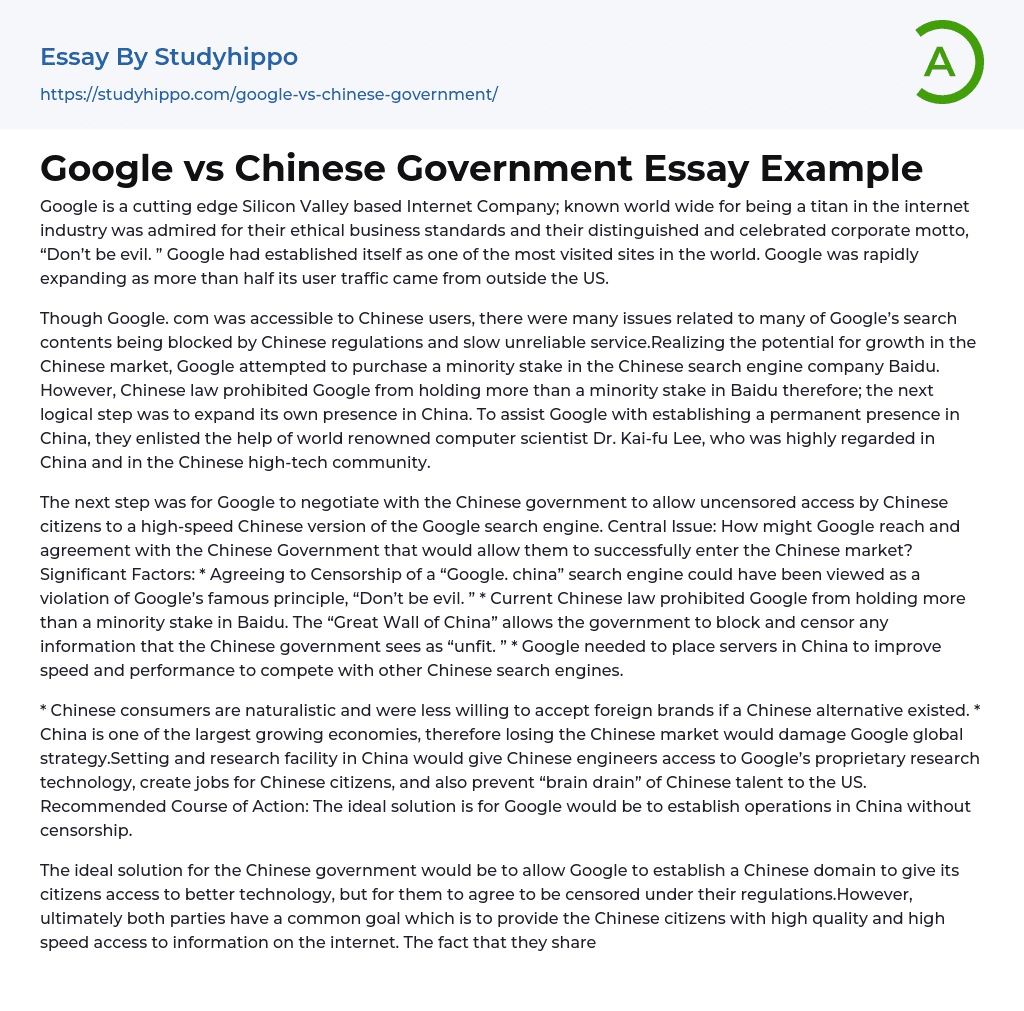Google, a Silicon Valley internet giant, is renowned globally for its industry dominance and ethical values expressed through the slogan "Don't be evil." With more than 50% of its user traffic coming from an extensive international audience, Google remains one of the world's most popular websites and symbolizes success.
Google.com faced difficulties in China due to regulations, resulting in blocked search content and unreliable service for Chinese users. Despite this, Google recognized the potential of the Chinese market and pursued a minority stake in Baidu - a local search engine company. However, Chinese law limitations restricted Google to only hold a minority stake in Baidu. To expand their presence in China, they sought assistance from Dr. Kai-fu Lee - a respected computer scientist within China's high-tech community.
Google endeavored to negotiate with the Chinese government to offer citizens a fast and
...uncensored version of Google search engine specifically tailored for China. However, this initiative posed significant challenges that needed careful consideration. Initially, creating a censored "Google.china" search engine could have been interpreted as violating the company's ethical "Don't be evil" principle. In addition, in accordance with Chinese law, Google was restricted from owning more than a minority share in Baidu. Lastly, due to China's "Great Wall," the government had full authority to censor any inappropriate information; therefore, Google had no alternative but to establish servers within China so that their search engine could keep up with other prominent Chinese search engines in terms of speed and performance capabilities.
Google faces a risk to its global strategy due to Chinese consumers' preference for domestic brands over foreign ones, as China is a significant market. To counter this, Google can
establish a research facility in China providing local engineers access to proprietary technology and creating job opportunities for citizens. This would also prevent the talent drain from China to the US. The optimal approach for Google would be launching operations in China without censorship.
Although the Chinese government wants Google to establish a Chinese domain and comply with their censorship regulations, both parties have a shared purpose of granting fast access to top-notch information on the internet for Chinese citizens. This common objective indicates an opportunity for a collaborative agreement that would benefit both Google and the government. Therefore, prior to engaging in discussions about censorship policies with China's governing body, Google's negotiation team should devise strategic planning measures.
To achieve success in a negotiation, the first step is setting goals. In the case of Google negotiating with the Chinese government, the goals may involve creating a Chinese version of their search engine or removing censorship from the existing google.com domain. However, understanding each other's position is crucial to believe in the validity of their arguments. Google's perspective is that the Chinese government must realize that bending its philosophy of "Don't be evil" to comply with regulations could damage their image among investors and media. In contrast, The Chinese government's viewpoint is that Google must recognize that its corporate philosophy regarding censorship cannot apply universally to all foreign nations in which they choose to do business.
To establish trustworthy connections, the next step is to focus on building relationships by understanding and acknowledging the objectives of both Google and the Chinese government. While Google aims for a solution that aligns with their business ethics while
supporting financial goals, China's primary goal is to provide their citizens and corporations with access to top technology in order to achieve technological equality with the US. The negotiation team must develop a strategy for clear communication channels between themselves and Chinese officials through frequent informal and formal meetings on both US and Chinese soil, aiding in understanding preferred communication styles from both parties for more effective communication.
To reach an integrative agreement, both the Chinese government and Google must be willing to engage in negotiations. The Chinese government should sustain its political power, while Google should safeguard its ethical and financial interests while functioning in the Chinese market. Successful negotiations could pave the way for a long-lasting and mutually advantageous collaborative relationship between the two parties.
- Federal government essays
- Armed Forces essays
- Confederate States Of America essays
- Federal Government Of The United States essays
- Fourteenth Amendment To The United States Constitution essays
- Governance essays
- Parliament essays
- Politics essays
- Jurisdiction essays
- Bureaucracy essays
- Separation Of Powers essays
- Congress essays
- President essays
- United States Congress essays
- Non-Commissioned Officer essays
- Appeal essays
- Revenge essays
- Corporate Governance essays
- Public Service essays
- Income Tax essays
- Supply essays
- Red Cross essays
- Democracy essays
- State essays
- Liberty essays
- Absolutism essays
- Reform essays
- Republic essays
- John Marshall essays
- Bourgeoisie essays
- Developed Country essays
- Elections essays
- International Relations essays
- Left-Wing Politics essays
- Monarchy essays
- Political Corruption essays
- Political Party essays
- Political Science essays
- Sovereign State essays
- United Nations essays
- World Trade Organization essays
- Contras essays
- Dictatorship essays
- Foreign policy essays
- Monarch essays
- Corruption essays
- Foreign essays
- Democratic Party essays
- European Union essays
- President Of The United States essays




